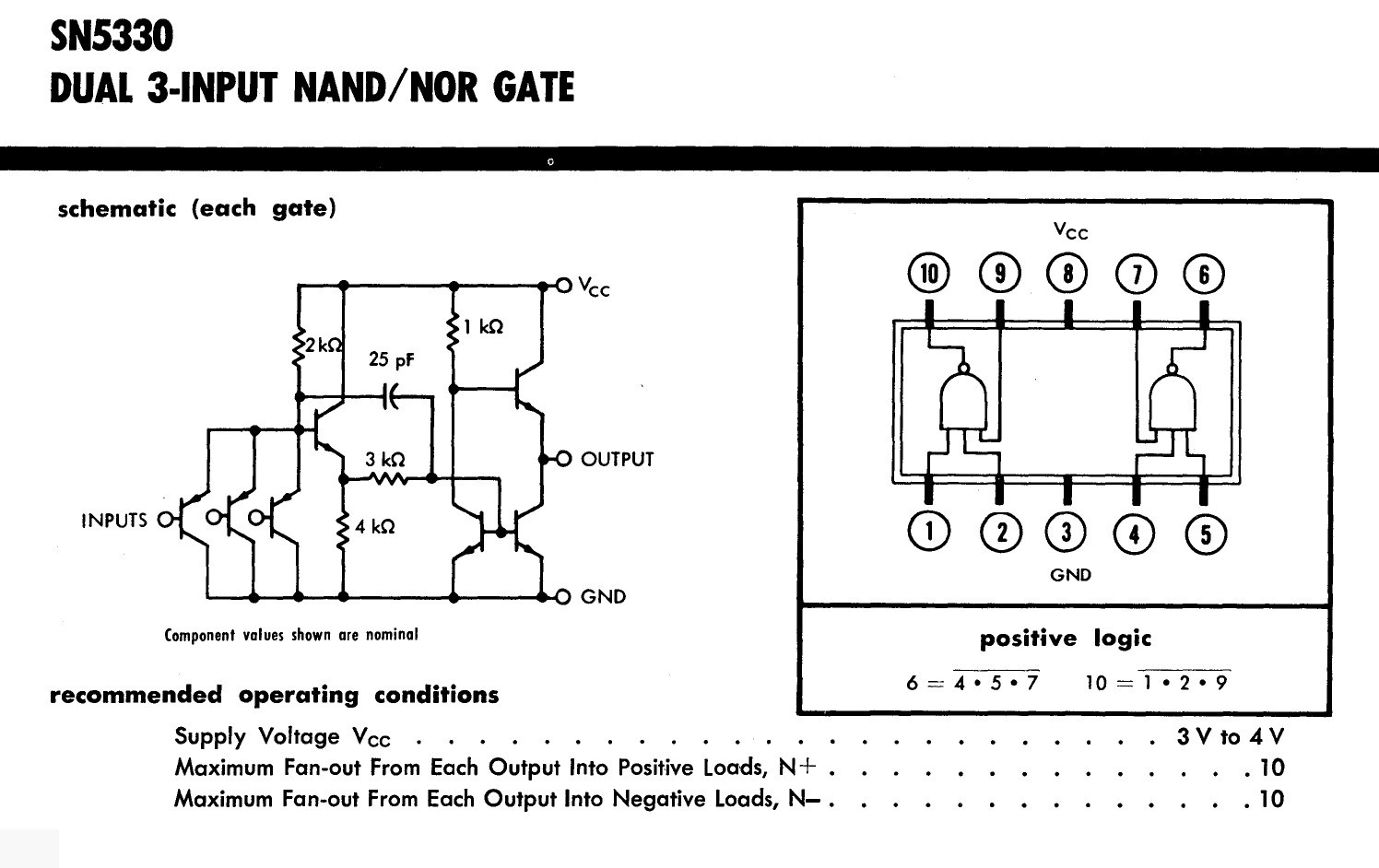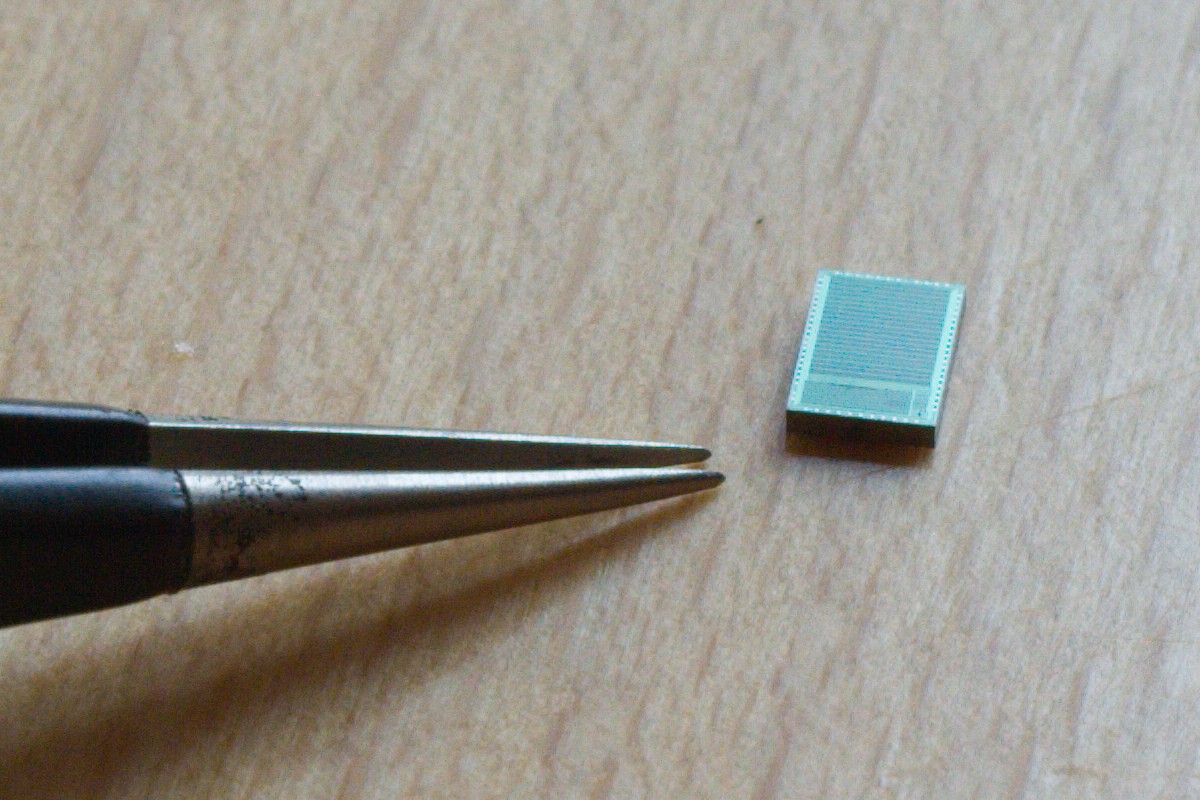-
"Modified DTL" by TI
02/07/2026 at 00:59 • 3 commentsTTL is just a modification of DTL, itself derived from RTL...
In 1967 you could purchase this chip for about 11USD. Barely enough to build a dumb flip-flop.
![]()
Note that ECL would also use transistors as input buffers / impedance adapters but the amplification chain is different and DTL/mDTL/TTL saturate and have a much higher signal swing, much better noise immunity and ... longer cycle times.
The other difference with ECL is the use of complementary transistors, which make it harder to build with old transistors since they are mostly one polarity only. But it's a nice little circuit to analyse :-)
SRC: https://www.facebook.com/photo/?fbid=1419577419961171 (thanks to the author of the macro pictures)
-
Vintage bipolar analog switch
01/20/2026 at 00:52 • 1 commentIt's not exactly related to Ted Yapo's blog https://hackaday.io/project/162998-the-rise-and-fall-of-pulses/log/158851-a-toy-diode-sampler but it's close...
Inspired by Curious Marc's recent video:
I had to try a sim with Circuitjs and it works like a charm !
![]()
Why does it matter to me ?
Because I have struggled a LOT to make a DFF gate with bipolar transistors... I had found a version that looked promising for a latch but it became unstable when connected to other devices.
The insights of this pass gate could probably help solve this enigma at last.
Oh and I should get the polarities right....
And then, there is this gem : https://w140.com/tekwiki/images/9/97/Frye_s4_gate.pdf where the value is sampled at the falling edge, almost working as a DFF but with diodes.
-
LibreSOC and TinyTapeout pictures @FSiC2024
06/23/2024 at 01:36 • 6 commentsWe talk a lot about architectures and semiconductors.
At the FSiC2024 conference in Paris, I saw real integrated circuits and took pictures, including TinyTapeout chips and the LibreSOC samples/prototypes.
I have uploaded some of them on Wikipedia to contribute to the Libre-SOC page.
![]()
![]()
![]()
And here Thorsten showing some TT samples in bare die and QFN package.
And one board demonstrated by @matt venn !
.
My Projects
Projects I Contribute To
My Hackerspaces
My Pages
Things I've Built
1KW LED lighting
2006: I designed and built all the electronics of a store's architectural element. 432 3W Luxeon LEDs split in 9 sectors with independent dimming with my first HTTP-based remote controller...
Lambda
LED desk lamp concept design. 2008
Drosephyia
Working as SubFlower, Igor & I built a sort of electronic plant in 2005 for an exhibition at Biche de Bere art gallery.
Projects I Like & Follow
Share this profile
ShareBits
Become a Hackaday.io Member
Create an account to leave a comment. Already have an account? Log In.
I feel so smug today.
Not having to include special formatting libraries to output debug messages in VHDL, be like
report character'val(13) & " Init=" & std_logic'image(Init)(2)
Hi Yann, thank you for following and liking my project #Isetta TTL computer ! Did you notice that you are following 1001 projects (or is that binary) ?
Hey !!!
thanks back roelh :-)
I thought it was way over 9000 ;-)
Thank you for liking, following and my #CMOS Homemade Operational Amplifier ! The offset adjustment is subtle, but ultra-high input impedance characteristics have been achieved. I am planning to conduct further operational experiments from now.
You're welcome ! I appreciate your works a lot !
Thank you for following me ! Recently, while verifying an application for calculating the position of a planet with a homemade floating-point interpreter, I found a case where the calculation stack operation was incorrect, so I updated the interpreter's code.
Hi Yann,
Merci for liking and following #MINITEL + ESP32 :))
Thank you for liking and following my #Homemade Operational Amplifier !
You're welcome !
You made me want to try this with Germanium transistors ;-)
This one looks pretty good: http://abload.de/img/je-918_documentation_9ab6k.jpg
That's a good idea! Please let me know if you get any results.
Thanks for following #But How Do It Know? 8-bit CPU Build !
Hey Yann, Thank you for the follow/like of #Starburst :-)
Thank you kindly Yann for the like/follow for #LLTP - Light Logic Transistorless Processor :-)
Like LEGO, synth design is something i'll never be able to rid my brain of.
IKR, I wake up sometimes after dreaming of stuff like this ;-)
You're welcome !
Designing crystal oscillators is a kind of dark magic so any help is welcome :-)
Hi Yann, thank you for liking and following the #Kobold K2 - RISC TTL Computer !
Hi Yann, thanks for liking and following the Kobold computer project !
Yann, thanks for re-liking #1 Square Inch TTL CPU. Did you see my new Kobold computer project ?
Damn, do I have to build EVERYTHING myself? :-D
Thanks for another, #The House Of Fun
 Yann Guidon / YGDES
Yann Guidon / YGDES Dr. Cockroach
Dr. Cockroach Alex
Alex Arya
Arya Morning.Star
Morning.Star







 zpekic
zpekic Robert
Robert Ryan
Ryan MatNieuw
MatNieuw SHAOS
SHAOS Tim
Tim Rob Smith
Rob Smith Jeroen Brinkman
Jeroen Brinkman Keith
Keith Roland Brake
Roland Brake







